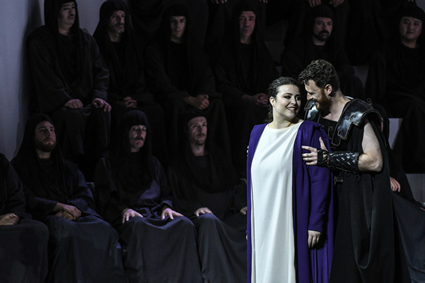| Opera Reviews | 4 May 2024 |
The revenge of a mother, the end of a worldby Lorenzo Fiorito |
|
Manfroce: Ecuba |
|

Roberta Mantegna (Polissena), Norman Reinhardt (Achilles)
|
|
|
Manfroce’s Ecuba was one of the main courses of the 45 year old Festival della Valle d’Itria in Martina Franca, where the re-discovery of some of the many excellent composers of the so-called Golden century of the Neapolitan School is a regular occurrence. This year’s choice was Nicola Manfroce, a Calabrian who studied in Naples, whose too short life (he died at 22 in 1813) did not allow him to develop all of his potential: Rossini himself considered him a promising rival, had he not passed away so young. The staging of Ecuba was delivered in the scenic courtyard of the Palazzo Ducale in Martina Franca; the setting by Pierluigi Pizzi - who designed also the scenery and costumes – started with an impressive evocation of the Deposition from the Cross, the corpse of a semi-naked Ettore being laid on an altar at the centre of a white symmetrical scene, while men and women of the choir sat on some large steps at the corners. The main character of the tragedy is the queen of Troy, mother of Ettore who has just been killed by Achille. Nonetheless, Polissena, the queen's daughter, is in (reciprocated) love with the Greek hero; King Priamo gives his assent to their wedding, in the hope to make peace with the Trojans’ enemies. Ecuba decides to take revenge on Achille, though, even though this will lead to the destruction of Troy. Pizzi was able to create an atmosphere of deep tragedy, with the chief character depicted like a ruthless woman whose only desire was to take revenge on the man who has murdered her son. And so she does, in spite of the fact that Achilles is to marry Polissena and that Achilles’ assassination means the end of her world. Carmela Remigio as Ecuba showed a well-rounded dramatic soprano, with a lovely lyricism in her voice, when needed, full of cold rage when plotting Achille’s murder. Roberta Mantegna sang the role of Polissena. She did her best with proper singing lines, with a beautiful voice and expressive intonation. Mert Süngü as Priamo and Norman Reinhardt as Achille did not impress very much; the former had a tougher texture, though, and was quite convincing in his rendition of the King, while Reinhardt showed less vocal and acting prowess. Minor roles were sung by Martina Gresia as Teona, Lorenzo Izzo as Antiloco and Nile Senatore as a Greek Commander. Most of Manfroce’s score (to a convoluted libretto by Giovanni Schmidt) was refined and “erudite”, only some passages were a bit rougher and less pleasant to listen to. The conducting was entrusted to the baroque specialist Sesto Quatrini, after Fabio Luisi unexpectedly pulled out; Quatrini led the Orchestra del Teatro Petruzzelli in an insightful and authoritative manner, with the skills and experience needed to lead an impervious score.
|
|
| Text ©
Lorenzo Fiorito Photo © Clarissa Lapolla |
|







